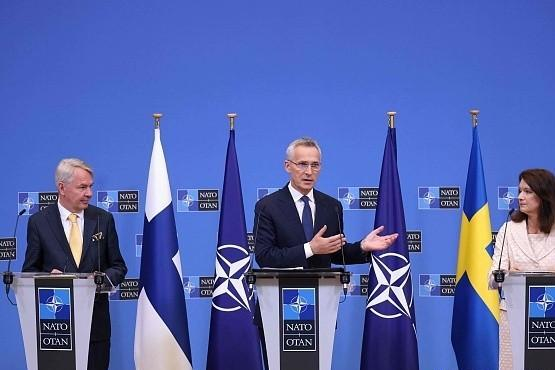
Sweden formally became the 32nd member of NATO yesterday, ending more than 200 years of neutrality and marking a major realignment in Europe's security landscape. Since 1814, Sweden has maintained a neutral stance and enjoyed nearly two centuries of peace and prosperity. Today, this historic shift will undoubtedly have a profound impact on the political and security landscape in Europe and beyond.
"Today is a truly historic day," Swedish Prime Minister Kristelsson said after presenting the accession papers. "Sweden is now a member of NATO and we will defend freedom alongside the countries closest to us in terms of geography, culture and values." These words reflect not only Sweden's strong determination to join NATO, but also its persistent pursuit of freedom and security.
Us Secretary of State Blinken pointed out in receiving the document that before the conflict between Russia and Ukraine, it was almost unthinkable for Sweden to give up its neutral status, but now polls show that Swedish people's views on joining NATO have changed dramatically. This change is not only the inevitable result of the evolution of the international situation, but also the deep consideration of the Swedish people for national security and future development.
NATO Secretary General Jens Stoltenberg also said that Sweden's membership will make NATO stronger, but also bring more solid security guarantees for Sweden. This statement undoubtedly provides a strong endorsement for Sweden to join NATO, and also shows NATO's welcome and expectations for Sweden. The consequences of Sweden's action on the world landscape could be manifold.
First of all, as an important country in Northern Europe, Sweden's accession to NATO will enhance the influence of NATO in the region. Sweden has a strong military strength and scientific and technological capabilities, which will provide NATO with more strategic options and combat capabilities. At the same time, Sweden's accession will also increase NATO's border with Russia by more than 1,300 kilometers, thus increasing tensions between the two sides.
Second, Sweden's entry could trigger a chain reaction among other countries. As a neutral country, Sweden has always maintained good relations with other countries. However, after joining NATO, Sweden will have to face potential conflicts with countries such as Russia together with NATO countries. This could lead other countries to reconsider their neutrality policies in order to safeguard their own interests.
Moreover, Sweden's entry could have implications for Europe's geopolitical landscape. As an important member of Northern Europe, Sweden's accession to NATO will make NATO's influence in Europe more consolidated. At the same time, it could also raise concerns among other European countries, especially those bordering Russia, who may strengthen their own defense capabilities in response to potential security threats.
Finally, Sweden's accession may also have a certain impact on international relations. As one of the permanent members of the UN Security Council, Sweden's accession to NATO may challenge the influence of the UN in international affairs. At the same time, it may also trigger a rethink of the international order and rules in other countries.
To sum up, Sweden's accession to NATO after ending its neutrality policy will have many impacts on the world pattern, including strengthening NATO's influence in the Nordic region, triggering a chain reaction in other countries, changing the geopolitical pattern in Europe and affecting international relations. These impacts require countries to pay close attention to and take appropriate countermeasures.

Recently, according to Xinhua News Agency, Israel's air strike on the southern suburbs of Beirut, the capital of Lebanon, has once again pushed the tense situation in the Middle East to the forefront.
Recently, according to Xinhua News Agency, Israel's air str…
A strongly worded report from the Equality Trust argues tha…
On November 27, 2025, Alibaba officially entered the global…
The focus of the global financial market in 2025 has always…
On November 25th local time, European Commission President …
As the Russia-Ukraine conflict remains deadlocked, diplomat…